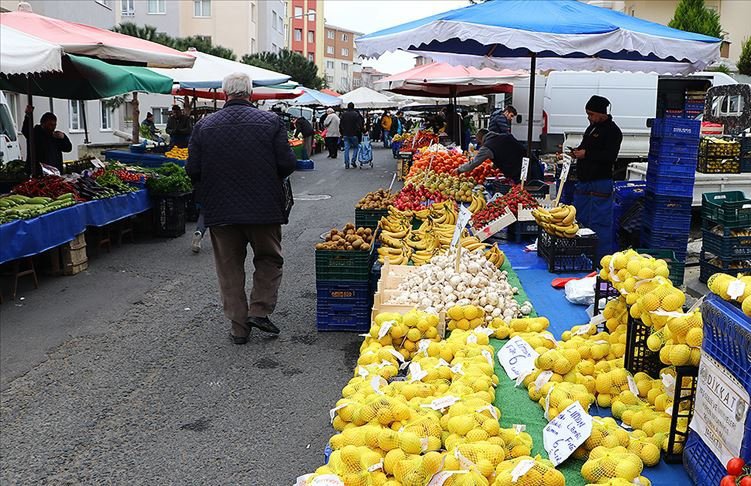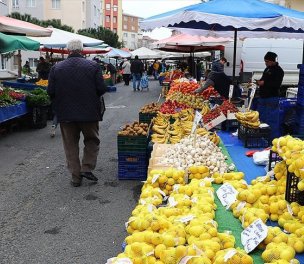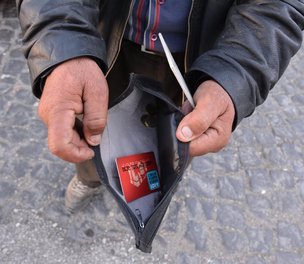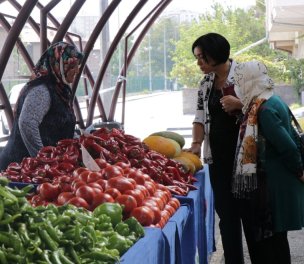Photo: AA/File
As massive inflation damages the Turkish lira, wages close to the poverty and starvation lines are becoming more common, according to the October 2022 Starvation and Poverty Line Survey released by the Confederation of Turkish Trade Unions (Türk-İş).
For a family of four living in the capital of Ankara, the starvation line, defined as the minimum food expenditure for a healthy, sufficient, and balanced diet, was 7,425 lira in October (1 US dollar = 18.61 Turkish lira).
The poverty line, defined as the total amount of necessary expenditures, such as housing, transportation, education, and health, reached 24,185, five times the minimum wage of 5,500 lira.
2023 arrangements
In Türkiye, about 57 percent of workers earn a minimum wage, according to the Confederation of Revolutionary Trade Unions of Turkey (DİSK). The minimum wage of 2023 will be determined by the Minimum Wage Determination Commission, which is expected to meet in early December.
On October 13, Minister of Labor and Social Security Vedat Bilgin said, "We will make an arrangement that will eliminate the damage of inflation on workers."
Recently, there have been claims in the press that the minimum wage will be raised to 8,500 lira. This means an increase of about 75 percent.
The minimum wage increased from 2,825 lira in 2021 to 5,500 lira in July 2022. Nonetheless, compared to other European countries, while the minimum wage in Türkiye was above that of many Eastern European countries in 2015, in the last year, Bulgaria, Serbia and Montenegro, surpassed Türkiye's gross minimum wage.
Melting purchasing power
People's purchasing power is also melting as Türkiye's inflation is reaching a high point not seen since the 1990s. The official annual inflation rate was 83.45 percent, and the monthly rate was 3.08 percent in September.
In contrast, the Inflation Research Group (ENAG), an independent group of economists, found that the annual inflation rate was 186.27 percent, and the monthly inflation rate was 5.30 percent.
This inflation is increasingly visible in Türkiye's rising food prices. According to Türk-İş, the average price of cheese increased by 12 percent in the last month, and the average cost of yogurt increased by 15 percent. The price of yogurt exceeded 30 lira for the first time. Rice increased by 8 percent and pasta by 9 percent. Tea and honey increased by 11 percent, and spices by 20 percent.
The country's average household income increased by 10.6 percent compared to the previous year and reached 76.733 lira, according to the 2021 data of the Turkish Statistical Institute (TurkStat). However, this increase is well below the inflation rate, meaning that most of society has experienced a noticeable welfare loss.
Increasing income inequality
Salaried employees especially see a decrease in their income compared to employers. According to TurkStat data, while salaried employees received 40 percent of the national income in 2016, this rate decreased to 38 percent in 2020 and 25 percent in 2022. The share of companies in the same years was 41 percent, 42 percent, and 54 percent, respectively. Employers now earn three times more than salaried employees, with an average income of 136,280 lira and 46.836 lira.
Despite Türkiye increasing its corporate tax and income tax rates in the last two years, the collection rates of these taxes are meager. Therefore, taxes' effect on reducing inequality is still low, according to a recent Oxfam report.
Türkiye is increasingly becoming more unequal, as the wealthiest one percent owns 41 percent of the country's total wealth.
According to Türkiye Raporu, the 20 percent with the highest disposable household income has almost half of the country's total income. The lowest 20 percent only has 6.1 percent of the total income, meaning an eight times difference between the wealthiest and poorest in Turkish society. (WM/VK)








